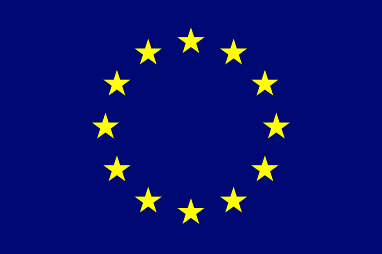Publications
Throughout the year, VOICE produces and disseminates key documents reflecting on humanitarian aid issues at the EU level and from an NGO perspective. They are addressed to decision-makers within the European institutions, at the National level, to NGO networks and other stakeholders of the humanitarian community, as well as to the VOICE members. Some documents are produced by the VOICE Secretariat with the support of VOICE members while others are publications from members and other key stakeholders in the humanitarian sector.
Please note that members-only documents will not be visible unless you are logged in.
-
Breaking the cycle of conflict, hunger and human suffering
10 September 2018Members' publicationsThis report is the final publication in a series of papers exploring the humanitarian consequences of conflict and proposing new
ways to break the cycle of conflict, hunger, and human suffering. Conflict is the single greatest driver of humanitarian crisis today, and the biggest
threat to progress towards a more prosperous, stable and sustainable future. The world is an increasingly dangerous place. After a period of relative gains in global
peace, conflict has significantly increased in the past decade. -
High Level Conference on the Lake Chad Region
03 September 2018Members' publicationsThis short paper complements “Supporting the Lake Chad Communities on the Path towards Peace and Sustainable Development”, a statement endorsed by 43 organizations providing multi-sectoral support in affected regions across Nigeria, Cameroon, Chad, and Niger. Whereas the ten requests in the statement directly target the governments of the affected countries, this paper sets out concrete recommendations for all actors. The paper recommends a three-pronged approach of 1) building around community 2)safeguarding protection and 3) enabling environment that needs to be urgently implemented to simultaneously save and rebuild affected populations’ lives. -
High Level Conference on the Lake Chad Region
03 September 2018Members' publicationsCaritas is working in each of the four countries to help some of the millions of people affected by the crisis by protecting civilians; supporting land rights and livelihoods; peacebuilding; and improving education and health services. At the Berlin conference, Caritas will use its long experience working among local communities to make a series of recommendations to governments, donors, UN agencies and NGOs. -
High Level Conference on the Lake Chad Region
31 August 2018Members' publicationsAhead of High-Level Conference on the Lake Chad Region 3-4 September, Berlin, Germany, 43 INGOs operating in the Lake Chad Basin region published a paper which sets out concrete recommendations for all actors, including governments, NGOs, UN, traditional and non-traditional donors, to action the requests. -
High Level Conference on the Lake Chad Region
31 August 2018Members' publicationsThis document provides Plan International’s key messages and recommendations for donors and governments attending the High-Level Conference on the Lake Chad Region on the 3 rd and 4th September 2018 t -
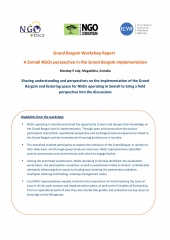
Somalia Grand Bargain workshop Report
30 August 2018VOICE event reportsThe Report of the Grand Bargain workshop in Somalia organised by the 3 NGO networks: ICVA, VOICE and the Somalia NGO Consortium to inform Somali NGOs on the Grand Bargain progress and gather input directly from frontline responders. -
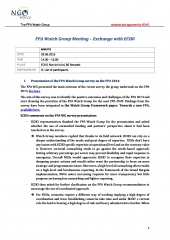
-
InterAction-Disinformation Toolkit
10 August 2018There is growing concern that international NGOs and civil society are vulnerable to online attacks and campaigns that spread false information. These attacks are designed to intentionally sow division and confusion, disparage targeted organizations and their leaders, and promote inaccurate views about the communities they support. In response to this growing and complex problem, InterAction has created this resource to help international organizations initiate a conversation on how disinformation might impact them. This report draws on desk research and interviews with civil society organizations and international aid organizations providing direct development and humanitarian assistance around the world. -

Joint NGO statement on attack in Hodeidah on 2 August
08 August 2018Members' publicationsJoint statement condemns the major attacks that hit a fish market and the entrance to Yemen's largest hospital, Al Thawra, in Hodeidah on 2 August, which reportedly killed over 40 civilians, including children. -
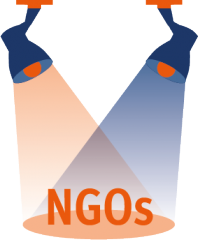
NGO Statement to the Somalia Partnership Forum in Brussels
17 July 2018Members' publications -
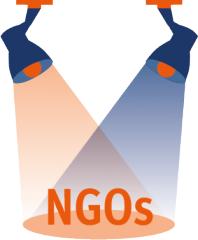
NGOs Statement - Comprehensive Response to Drought in Afghanistan
10 July 2018Members' publications -
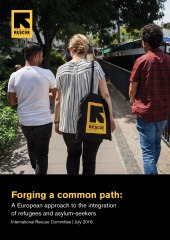
Forging a common path: A European approach to the integration of refugees and asylum-seekers
10 July 2018Members' publicationsInternational Rescue Committee newest report on refugee integration in Europe -

VOICE Statement on the next Multiannual Financial Framework (MFF) and the 2019 EU budget
09 July 2018VOICE position papersOn May 2, the European Commission(EC) released its Proposal for a Regulation laying down the multiannual financial framework for the years 2021 to 2027 and Communication ‘A Modern Budget for a Union that Protects, Empowers and Defends’ with its annex, followed on June 14 by a set of proposed regulations for external instruments. On May 23, the EC also presented its proposal for the EU budget 2019. In reaction to these proposals, the VOICE network shares the following remarks and recommendations with the EU Member States and the European Parliament. -
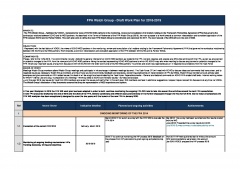
FPA Watch Group Work plan - July 2018
08 July 2018FPA Watch GroupThis FPA Watch Group work plan 2018-2019 is a working document that will be regularly updated. -
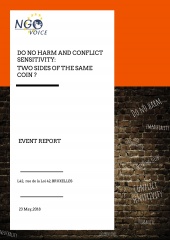
Conflict Sensitivity and Do No Harm: two sides of the same coin?
06 July 2018VOICE event reportsOn 23 May, VOICE hosted an event entitled “Do no harm and conflict sensitivity: two sides of the same coin?”. The event brought together VOICE members, leading practitioners from the humanitarian community as well as peacebuilding NGOs, academics and EU institutions’ representatives. The four panelists were Paul Murphy, Executive Director of Saferworld, Martina Zapf, Head of Programme Support at Interpeace, Peter van Sluijs, Senior Strategist at CORDAID and Michael Kühn, Senior Policy Advisor from Welthungerhilfe. The discussion was facilitated by Birte Hald, Brussels Representative of Danish Refugee Council. -
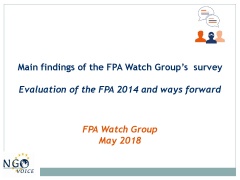
Main findings of the Watch Group’s survey: Evaluation of the FPA 2014
29 June 2018FPA Watch GroupWith this survey, the FPA Watch Group wishes to evaluate the current FPA (2014-2020), to provide input in the upcoming consultations on the next FPA and shape the future work of the Watch Group. -
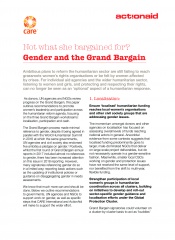
Not what she bargained for? Gender and the Grand Bargain
28 June 2018Members' publicationsThis paper outlines recommendations to promote women’s leadership and participation across the humanitarian reform agenda, focusing on the three Grand Bargain workstreams:localisation, participation and cash. -
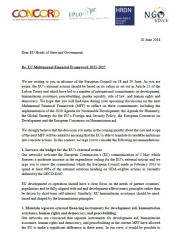
Joint NGO networks letter to European Council June 2018 - External action in the next MFF
22 June 2018Joint letter of the networks VOICE, HRDN (human rights and democracy), EPLO (peacebuilding) and CONCORD addressed to the EU Heads of States and Governments ahead of the European Council meeting of the 28 and 29 June which will discussed the next Multiannual Financial Framework and external affairs.
The letter includes key common recommendations of the four networks. -
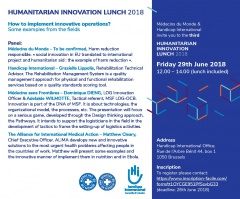
3rd Humanitarian innovation lunch: How to implement innovative operations?
19 June 2018The agenda of the lunch-event dedicated to innovation in humanitarian aid. -
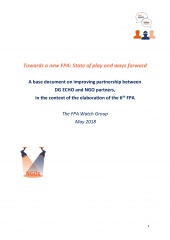
Framework paper: Towards a new FPA: State of play and ways forward
12 June 2018FPA Watch GroupThe present document 'Towards a new FPA: State of play and ways forward' is a base document developed by the FPA Watch Group on behalf of all ECHO NGO partners ahead of the elaboration of the 6th FPA.
Building on the experience of ECHO FPA partners reflected throughout the previous years in the FPA Watch Group work plan and main discussions points, the present document has been developed as a joint paper gathering the FPA Watch Group main recommendations towards the next FPA. -
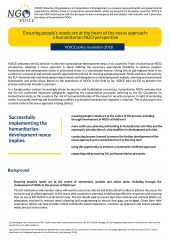
'Ensuring people's needs are at the heart of the nexus approach: an NGO perspective' - VOICE Policy Resolution 2018
08 June 2018VOICE policy resolutions"Ensuring people's needs are at the heart of the nexus approach: an NGO perspective" this is the title of the Policy resolution adopted by VOICE network, during the General Assembly 2018
-
Exploring and fostering space for NGOs to add value in large scale operational models for humanitarian cash transfer programmes
30 May 2018VOICE event reportsThis report is a summary of the key messages and main outcomes of the same workshop, organised by VOICE in the framework of its Grand Bargain project funded by the Belgian MFA. The event offered space for practitioners (including NGOs, the UN, the Red Cross, EU Member States, private sector officials, academics, and EU representatives) to exchange on best practices and share experiences. Participants explored the role and added value of NGOs in large scale cash transfer programmes all along the program cycle from needs-assessment to monitoring but also in relation to coordination. -
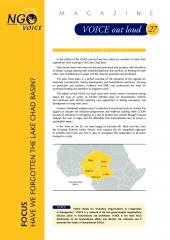
VOICE out loud 27 Have we forgotten the Lake Chad Basin?
29 May 2018VOICE out loudThis edition of the VOICE out loud explores the situation in the Lake Chad Basin. We have asked our members in ACTED, Accion contra el Hambre, COOPI, DRC, Concern Worldwide to share their experiences about this complex and proctracted crisis. -
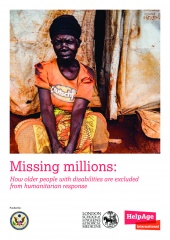
Missing Millions: how older people with disabilities are excluded from humanitarian assistance
09 May 2018Members' publications -
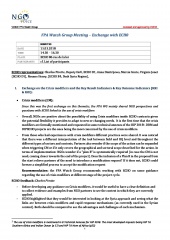
FPA WG meeting exchange with ECHO - 15 March 2018
08 May 2018FPA Watch Group

